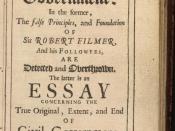Is your Identity 'Locke'd in place?
Will you be the same person after you finish reading this essay? You would like to think so, I mean if we are constantly becoming different people that would really inconvenience, well, just about everything. This question is one of personal identity over time, or what makes you, you and not, not-you. It seems simple right? Well it's really not. You might say that you are the same person now as 10 years ago because you are composed of the same cells then as now. If you said that you would be wrong, your body has a completely new set of cells every 7 years (Stanford Biology, n.d). It is tempting to say that you are your mind, well what if we scanned your mind and put it into two bodies at the same time? This would finally solve the problem of needing to be in two places at the same time, but you can't be in two places at the same time.
So what constitutes you? That's what I will explore in this essay. My approach will not use a legalistic framework and may even exclude a common sense interpretation. Rather I will use some pre-existing philosophical theories to critically analyse these issues.
John Locke (August 1632 - October 1704) was an English philosopher with perhaps the most sensible philosophy concerning the question. His theory of memory criterion makes the question a lot simpler. It is developed from the basic premise as follows: Necessarily, a person who exists at one time is identical with a person who exists at a second time, if and only if the first person can, at the first time, remember an experience the second person has at the second time, or vice versa (Locke, 1975). If you accept...


